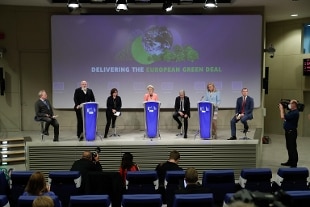The EU presents the maxi-plan on climate.
Von der Leyen, overcoming the fossil fuel economy
The EU and environmental policies, von der Leyen: "Towards a decarbonised economy"
Share
14 July 2021 The new EU climate package contains proposals "half cooked" and "missing the key elements".
This was stated by WWF Italy on the proposed "Fit for 55" measures on climate and energy to 2030, which is still considered "the most consistent and broad package presented so far. However, it is still far below what is necessary for a science-based and socially fair shift to climate neutrality. "
Highlights include the requirement that all revenues from the Emissions Trading System (ETS) go to climate action - certainly an improvement on the 50% spending recommendation in effect today. This is a crucial element in ensuring that the climate, and therefore EU citizens, benefit from this revenue. Another positive point is the measure that plans to bring international shipping into the ETS: this would finally help to tackle the sector's carbon pollution.
But these glimmers of progress are largely overshadowed by significant flaws and missing elements in the proposals.
In particular, the overall targets remain too low. WWF and many others have long pointed out that the 55% net emission reduction target must be closer to 65% gross reduction to help keep the temperature rise at 1.5 ° C and avoid a change. more dangerous climate (much more than we already see today, with an average increase in global warming of just over 1 ° C). The package does not address this gap: for renewable energy, for example, it only proposes a target of 40%, while 50% by 2030 would be much more useful for protecting the climate and building a sustainable economy in the future.
For the WWF, all objectives - from the Emissions Trading System to the Land Use sector - must be improved according to what is indicated by the scientific community.
"Key provisions are missing from the package, some are not right and others will actually do more harm than good. The EU must stop spending money on pollution through free distribution of allowances through the ETS, we must ensure that the poorest families are not disadvantaged, we must stop the practice of subsidizing the combustion of trees and crops for energy ", says Mariagrazia Midulla, Head of Climate and Energy at WWF Italy.
The 61% cut of emissions in the ETS is not enough to solve the most obvious problem of the mechanism. Free pollution - awarded to heavy industries in the form of emission allowances - is addressed only through the proposal to make free allocation conditional on investments to increase energy efficiency. However, if a company does not comply, it will still receive up to 75% of its previously allocated free shares. WWF wants the free assignment to end starting in 2023 and for the assignments to be auctioned instead.
The
Carbon Border Adjustment Mechanism
, which will put a tax on imports of certain goods from regions with less strict climate rules, should only be designed as a complement to the end of the free allocation of allowances under the ETS, not in addition to the free allocation. However, the Commission proposes to introduce a simplified CBAM for three years (2023-2026) and to completely eliminate free allowances only in 2035. ETS revenues should help finance the transition to climate neutrality.
The Commission also proposes measures, through the "Social Instrument" and the ETS, to ensure that its package does not have an unfair impact on some people or areas more than others, and this is a good thing. However, to be effective, these measures need to be adequately resourced, supported by comprehensive analysis and planned in an inclusive way. The extension of the ETS to transport and buildings is worrying because it could penalize the less well off. Another alarming element is the loopholes that could allow Member States to avoid using resources to support the most vulnerable, for example by reporting in a generic way the money used for climate and social measures, without necessarily "new" income. or additional from the ETS.
WWF records the Commission's failure to tighten bioenergy rules. Burning trees and crops for energy leads to an increase in emissions in relation to fossil fuels, both in general and in the time we have available to stop climate change. Yet, despite this, these practices will still be considered "renewable" and therefore eligible for public subsidies. This approach goes against scientific indications and risks undermining much of the EU's climate action.

